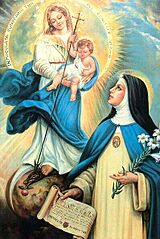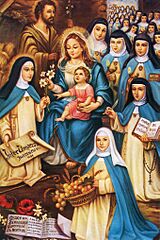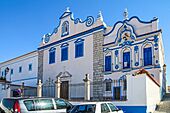Beatrice of Silva facts for kids
Quick facts for kids SaintBeatrice of Silva OIC |
|
|---|---|
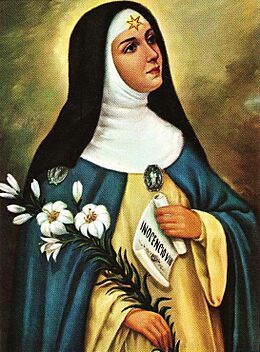 |
|
| Virgin | |
| Born | ca. 1424 Campo Maior, Alentejo Region, Kingdom of Portugal |
| Died | 16 August 1492 Toledo, Crown of Castile |
| Venerated in | Catholic Church (Conceptionist & Franciscan Orders, Spain & Portugal) |
| Beatified | 28 July 1926, Rome by Pope Pius XI |
| Canonized | 3 October 1976, Vatican City by Pope Paul VI |
| Major shrine | Monastery of the Immaculate Conception, Toledo, Spain |
| Feast | 17 August (1 September in the Franciscan Order) |
Beatrice of Silva (born Beatriz de Menezes da Silva around 1424 in Campo Maior, Portugal) was a Portuguese noblewoman. She became a saint and founded a special group of nuns called the Order of the Immaculate Conception. She is honored as a saint in the Roman Catholic Church.
Life of Saint Beatrice
Beatrice was one of eleven children. Her father, Rui Gomes da Silva, was a governor. Her mother was Isabel de Menezes. Beatrice's brother, Amadeus of Portugal, later became a famous reformer in the Franciscan Order.
For a long time, people thought Beatrice was born in Ceuta, North Africa. But new research shows she was born at her family's home in Campo Maior, Portugal.
When Beatrice was older, she went to live in the castle of Infante John. In 1447, she traveled with Princess Isabel of Portugal to Castile. Beatrice became a lady-in-waiting (a helper to the queen) when Isabel married King John II of Castile.
Beatrice and Queen Isabel were good friends. But soon, the Queen became very jealous of Beatrice's beauty. The Queen had Beatrice locked away in a small cell. While she was imprisoned, Beatrice had a special vision. She saw the Blessed Virgin Mary, who told her to start a new religious order (a group of people dedicated to God).
Beatrice eventually managed to escape. She found safety in a Dominican monastery in Toledo, Spain. She lived a very holy life there for 37 years. She did not officially join that group of nuns.
In 1484, Queen Isabella I of Castile gave Beatrice and some friends a palace in Toledo. This became a new community called the Monastery of the Holy Faith. It was dedicated to honoring the Immaculate Conception of Mary.
In 1489, with permission from Pope Innocent VIII, the nuns followed the Cistercian Rule. They also prayed the daily office (special prayers) of the Immaculate Conception. Beatrice chose the special clothes for the nuns. Their habit is white, with a white scapular (a piece of cloth worn over the shoulders) and a blue mantle (a cloak). They also wear a medallion of Mary.
Beatrice died at the monastery she founded on August 16, 1492. Her remains are still honored in the chapel there.
Beatrice's Legacy
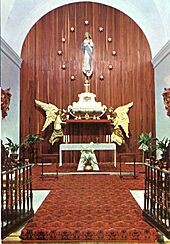
After Beatrice died, the nuns of her monastery joined with another group of nuns in 1501. This was approved by Pope Alexander VI. They then followed the Rule of St. Clare, which connected them to the Franciscans.
In 1511, Pope Julius II gave the new order its own special rules for life. This helped the community grow and become known as the Monastery of the Immaculate Conception.
A second monastery was started in 1507. From there, seven more were founded. The order quickly spread to Portugal, Spain, and even their colonies in South America by 1540. It also reached Italy and France. At its busiest time, there were about 200 monasteries of this order around the world.
Becoming a Saint
Beatrice de Menezes da Silva was declared "Blessed" (a step towards sainthood) on July 28, 1926, by Pope Pius XI. The process to make her a saint began in 1950. She was officially made a saint by Pope Paul VI in 1976.
Her feast day (a special day to remember her) is celebrated by the Conceptionist nuns and the Franciscan Order on September 1st in Spain. In Portugal, it was changed to August 17th in 2012.
See also
- De Silva Fernández de Híjar Portugal family


